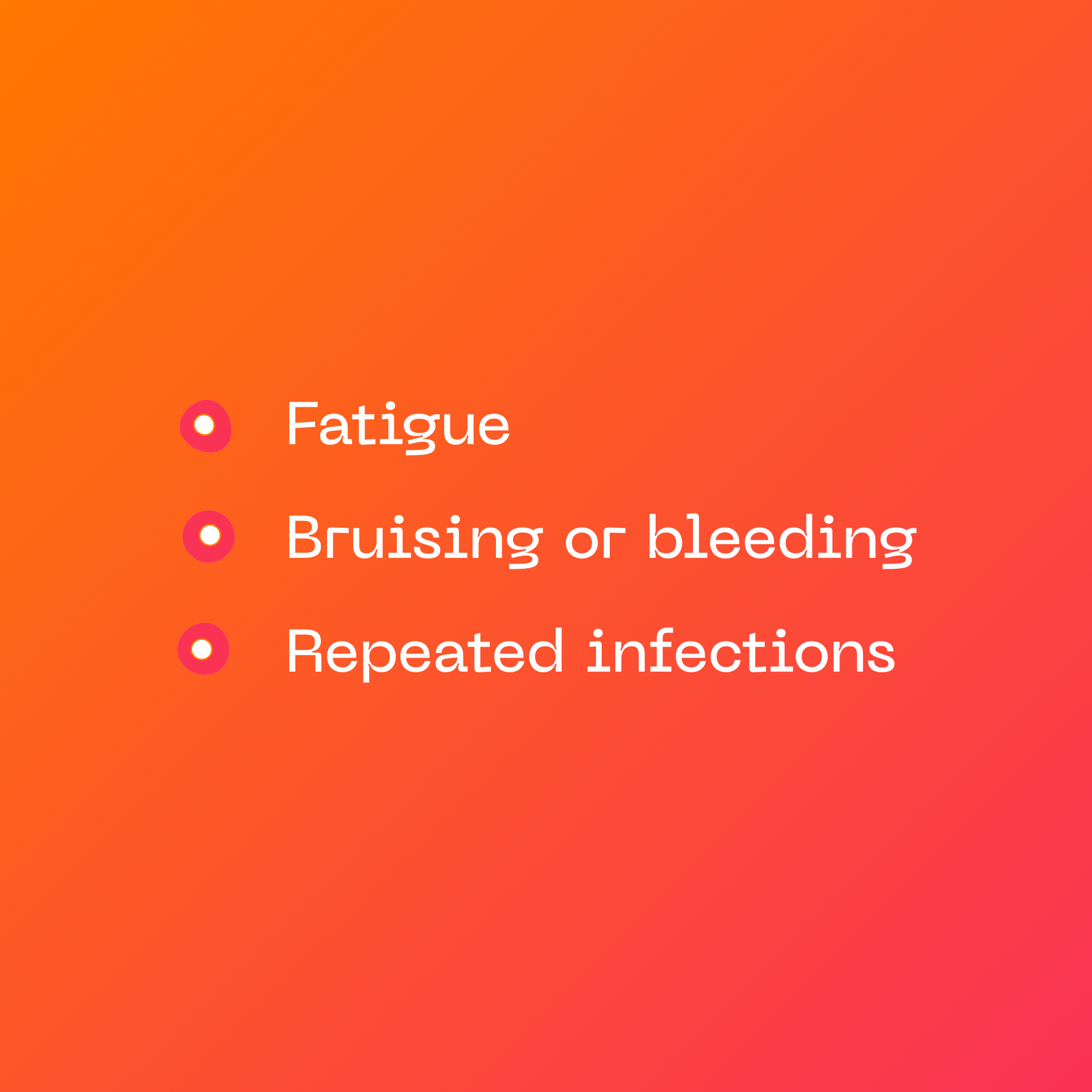
21 Apr 2023
Seven things you might not know about AML
Facts and figures updated in April 2024
Every year about 3,100 people in the UK are diagnosed with acute myeloid leukaemia, or AML, but how much do you know about the disease? And what is Leukaemia UK doing about it? 21st April is AML World Awareness Day and we’re joining the global blood cancer community to raise awareness of AML and shine a light on some of the research we’re funding. Research that we hope will accelerate progress in leukaemia treatment and diagnosis and improve the lives of those affected by the disease today and in the future.
1. AML is a cancer of the white blood cells
AML is an type of leukaemia that progresses rapidly, which is why it is called ‘acute’. This also means it usually requires immediate treatment. The word ‘myeloid’ refers to the type of white blood cells affected – the myeloid cells.
AML develops when the bone marrow produces abnormal white blood cells. These cells multiply uncontrollably, preventing the body from producing enough of the healthy blood cells it needs.
Other types of leukaemia include acute lymphoblastic leukaemia (ALL), chronic lymphocytic leukaemia (CLL) and chronic myeloid leukaemia (CML). AML is the second most common type of leukaemia.
2. The signs and symptoms can be ambiguous
 Like leukaemia more generally, the signs and symptoms of AML can be similar to those of common conditions, so it can be hard to spot. The common symptoms to look out for can include:
Like leukaemia more generally, the signs and symptoms of AML can be similar to those of common conditions, so it can be hard to spot. The common symptoms to look out for can include:
- Fatigue
- Bruising, bleeding or rashes
- Repeated infections
- Feeling weak or breathless
- Fever or night sweats
- Bone or joint pain
It’s important to know what’s normal for you. If you or a loved one experience one or a combination of these symptoms, it’s always best to ask your GP for a blood test.
3. Survival rates from AML are one of the lowest of any cancer type
Whilst improvements have been made, only 13.6% of people diagnosed with AML in the UK survive beyond five years. But research brings hope of a future where revolutionary new treatments could help stop AML devastating lives.
Every day, Leukaemia UK is accelerating progress through life-changing research that could hold the key to kinder, more effective treatments for people diagnosed with AML and other types of blood cancer.
4. AML is most common in the over 60s
AML doesn’t discriminate. It affects people of all ages – from babies to grandparents – but it is most common in the over 60s.
5. AML is more common in men
Around 1,300 females are diagnosed with AML each year in the UK, compared with around 1,700 males.
6. AML is the second most common type of leukaemia to affect children
Although children can be diagnosed with AML, treatment often works well – 5 year survival for children with the disease is now around 65-70%. Whilst it’s unacceptable that any child develops AML, the numbers are low in comparison to adults – with 77 under 15s diagnosed in the UK versus over 2,300 adults over 60.
Children with Down’s syndrome are 150 times more likely to develop acute myeloid leukaemia (AML).
7. We’re funding research to help stop AML devastating lives
Important discoveries are happening all the time within leukaemia research and we believe research has the power to stop AML devastating lives.
For his Leukaemia UK Project Grant, Professor Terry Rabbitts, Institute of Cancer Research, and his team will explore a new approach to targeting fusion proteins within cancer cells. This innovative approach holds the potential to minimise the debilitating side effects of current treatments.
Leukaemia UK is determined to create change and help more people survive AML through our research. Read Bex’s acute myeloid leukaemia story.
This April, you can support vital research into AML and other blood cancers. Thank you.
Find out more about AML World Awareness Day on the official AML World Awareness Day website.
Related posts
17 September 2024
The food industry’s great and good come together to celebrate 25 years of Who’s Cooking Dinner? and raise over £280,000 for leukaemia research.
London’s hottest charity culinary event, Who’s Cooking Dinner?, celebrated its 25th anniversary at The Dorchester on Monday (16th September). It was an event to remember with chefs including Tom Kerridge,…
30 June 2023
New book ‘Bronty’s Battle Cry’ supports Leukaemia UK
‘Bronty’s Battle Cry,’ an inspiring new picture book written by award-winning children’s author and young person’s counsellor, Hannah Peckham, has recently launched and Leukaemia UK are delighted that some of…
25 June 2019
Championing groundbreaking therapies and emotional support
We are proud to be at the forefront of funding innovative research into gene therapy treatments
31 October 2022
Leukaemia UK appoints new Director of Communications job share from Shelter to lead their ambitious strategy
Blood cancer research charity, Leukaemia UK, has hired Anna Wilson and Lizzie Afonso from housing and homelessness charity, Shelter, to job-share its new Communications Director role. This is the first…